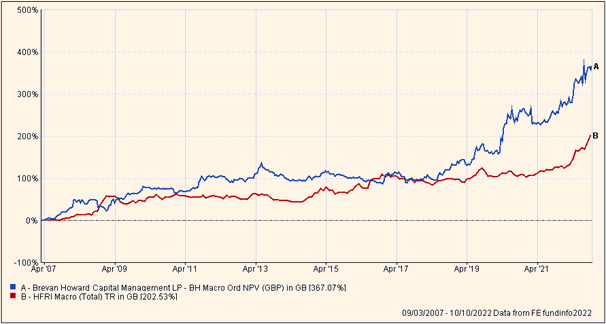Investment conditions

Growth (economic)
The macroeconomic outlook is uncertain, with sharp swings in expectations as market participants adjust to new data. The data suggests economies are deteriorating. We see a slowdown in both world GDP and possibly inflation. Economists predict a higher chance of recession in the UK and Europe than in the US, Japan and China. We have been fearful of the situation in China for some time over concerns about the sustainability of its export and domestic property-led recent growth model. The key issue for us is whether it is a hard or soft economic landing in the US as the Federal Reserve tightens policy to reduce inflation.
Interest rate & liquidity environment
Policy hawkishness is the main feature influencing markets. The central case is that inflation is peaking around now, presaging a peak in interest rates by year end or early 2023, which is being reflected in inverted yield curves. Central banks are reducing their balance sheets and market liquidity, which makes policy much more restrictive than headline interest rates imply.
Valuations & earnings outlook
World equity valuations (P/E ratio) have fallen significantly from their highs in 2021. Some areas look cheap, particularly the UK, where valuations are cheaper than they were after the 08/09 financial crisis. European and Japanese equities are also very cheap with, for example, Eurozone equities trading around their Covid lows. There is evidence that US corporate margins and earnings are beginning to come under pressure but are still holding up well. Our expectation is that corporate earnings will fall from here as economies enter recession. That said, earnings in Japan are growing, beginning to drive relative outperformance of this market.
Sentiment / flows
Sentiment is very poor based on survey submissions yet, in our opinion, actual investor positioning seems more ‘risk on’ with big institutional investors maintaining still high equity weightings. Perhaps the resilient earnings season is helping, and the idea that we may be near the peak in interest rates in the US.
Views by asset class

Equities
With elevated recession risks, we decided to trim our equities exposure, preferring to increase our cash levels and seek better risk adjusted returns in other asset classes. Despite being cautious on the outlook for economies, equities (asides from the most expensive mega caps) have derated on higher interest rates, and now demonstrate reasonable valuations and the dislocations within indices provide opportunities for good active managers to outperform.
Data in the US shows its continued strength relative to all other major economies. Unemployment is very low. Consumer and company balance sheets remain strong, earnings are holding up better than in many countries, and it has low external energy dependence, reflected in a very strong US dollar. The US remains our largest absolute equity allocation in portfolios.
Within the US, smaller companies have been hit hard and are trading near all-time valuation lows, significantly cheaper than the overall market. We think they could generate excess returns and continue to tilt portfolios in this direction.
The UK stock market is beginning to look interesting in our view. It’s incredibly cheap, and the high dividend yield compelling. Because the pound has fallen, it’s even cheaper for foreign investors. That said, it’s hard to see a catalyst for an improvement in investor sentiment and inflows, so we reconfirmed our low exposure to the UK stock market relative to other UK wealth managers, but we are watching for signs of a reversal of fortune.
Japan has very low unemployment (2.5%), and its economy is strengthening. These factors, coupled with a significant fall in the yen, have resulted in large increases in reported earnings for Japanese companies, yet its stock market continues to trade at depressed levels. We have reconfirmed our overweight to Japan, and may add more pending increased clarity on valuations, assessment of forward margins, sentiment, and investor positioning, and above all an identification of clear catalysts for a real pick up in investor (both domestic and foreign) interest.
With the business cycle turning down, costs increasing, and earnings beginning to come under pressure, last year we tilted our portfolios towards companies scoring high in quality metrics such as strong balance sheets, low financial leverage, high returns on equity, and the ability to pass on price increases to consumers. These companies are less likely to suffer earnings downgrades. Because of the outlook, we maintained our tilt towards quality factors in equities.
Government bonds
We decided to maintain our US Treasury positions, which provide a good yield, and exposure to the US dollar. They should continue to provide protection against adverse movements in other parts of our portfolios.
Having avoided most of the pain within UK government bonds this year, we discussed whether now may be a good entry point, since we can now invest at more attractive levels. We decided the outlook is too uncertain and decided to maintain our low exposure for now.
Corporate bonds
Yields on US bonds have increased to attractive levels, and we decided to increase our exposure to US investment grade bonds. We decided to fund this by reducing both equities and emerging market bonds. At this stage in the cycle, we see this as a safer way to take risk, we prefer to collect a good rate of interest lending money to creditworthy US companies than having that capital invested in stocks or emerging market bonds.
Alternatives
Alternative asset classes can provide protection during market falls, with returns not correlated to the rest of the portfolio. For this reason, we maintain our strongly positive view on the asset class.
We are positive on selective macro hedge funds with an established record of doing well in volatile environments.
We invested in broad commodity exposure to benefit from rising commodity prices, then took profits earlier in the year. We recently decided to sell this position, fearful of falling demand from slowing economies. We expect demand for copper to increase dramatically due to the energy transition and limited supply. Whilst it could be painful to hold it through a recession, we decided to maintain this strategic long-term investment.
Within low-risk portfolios we reduced some low-risk alternatives (an absolute return fund and a property fund), in favour of short-dated US Treasuries, since the yield on the latter is now so attractive.
Overall, the environment is characterised by high uncertainty and rising recession risk, so we remain cautiously positioned, but prepared to take advantage of opportunities that present themselves.
Summary of positioning

Below is a summary of our views for each asset class, from strongly negative (- -) to strongly positive (+ +).
Asset Class
| Asset class | -- | - | Neutral | + | ++ |
|---|---|---|---|---|---|
| Equities | X | ||||
| Government bonds | X | ||||
| Corporate bonds | X | ||||
| Alternatives | X | ||||
| Cash | X |
Asset Class Breakdown
| -- | - | Neutral | + | ++ | ||
|---|---|---|---|---|---|---|
| Equities | USA | X | ||||
| UK | X | |||||
| Europe | X | |||||
| Japan | X | |||||
| Asia ex-Japan | X | |||||
| Emerging markets | X | |||||
| Bonds | Government | X | ||||
| Index-linked | X | |||||
| Investment grade | X | |||||
| High yield | X | |||||
| Emerging market | X | |||||
| Convertibles | X | |||||
| Structured credit | X | |||||
| Alternatives | Commodities, gold + miners | X | ||||
| Macro hedge + other alts | X |
Investment Committee Q&A

In this feature we attempt to lift the lid on the process and our views by interviewing one of the decision-makers:
Andrew Fleming: Chairman of Saltus Asset Management and Asset Allocation Committee
The committee last met two months ago, what has happened since then?
Certainly lots in the UK. It has been an extraordinary month. I spent part of my career investing in emerging markets and the parallels being drawn between the UK and emerging markets are not far from the mark. Bigger picture, though, it is still all about what the US Federal Reserve does in response to higher inflation.
September was particularly tough for investors, why was that?
Risk assets like equities sold off as the relief rally over the late summer, in expectation that central banks would ‘pivot’ to a loosening posture, faded. At the same time, bond markets sold off in parallel as investors concluded central banks had more to do to tame inflation.
How have Saltus portfolios been faring?
Relatively well in the sense that we have preserved capital in down markets and managed to perform quite well as assets recovered. Overall, we have had the big picture things broadly right this year: very low bond weightings, quality and US medium sized equities, little in the UK, high alternative positions and commodity exposure that has been well traded.
What are the main reasons Saltus are performing differently to a lot of our competitors?
The key difference is in fixed income, where we foresaw the risks of holding bonds as central banks withdrew liquidity and raised interest rates following a multi decade period when bonds were seen as low risk. This attitude has been cruelly exposed this year. Secondly, we own funds and strategies that very few of our competitors hold.
Are there signs that inflation is peaking and could begin to fall?
Yes, there are signs, for example in the huge and important US mid-sized company sector, that wage rate pressure is easing, and they are also less aggressive in raising prices. Similarly, global supply bottlenecks and shipping rates are all reducing which point to lower inflation in goods. What worries me, however, is that service sector inflation is now rising and there are signs it could become quite entrenched against a background of still extremely low unemployment rates. It is this concern that a service sector price/wage cycle could become embedded, really for the first time since the 1970s, that is likely to make central banks particularly cautious about reversing course to return to an easing policy.
The market reacted very badly to the UK government’s mini-budget, why was that?
It clearly wasn’t credible economically or politically in the current climate. The UK has been running twin deficits in the trade account and the government budget for years. This was all fine when the UK, and others, could borrow easily at low rates as central banks purchased vast amounts of debt. This is now over as interest rates are raised. The UK is dependent in Mark Carney’s words “on the kindness of strangers” to finance these deficits. Confidence in the UK has been severely dented. These issues were going to come to a head at some point, but the fiscal announcement was clearly the occasion.
Is there “another UK” out there – a government bond market that could crack like ours has?
Yes, in my view. The UK is at the recent forefront but there are going to be lots of casualties in this cycle as all the borrowing and leverage that has built up in the period of abundant liquidity and negative real interest rates comes under pressure. This is countries and companies.
How concerned are you about the UK economy?
Very. It sounds like trying to be clever after the event, but I have never been a believer in LDI strategies for pension funds and certainly not one that involves leverage. The problem of LDI is much bigger than the gilt market hiatus of recent weeks as pension funds are natural providers of long-term equity risk capital in the UK and they aren’t providing this, as evidenced by the relentless selling of UK quoted equities. That said, company and household balance sheets are in much better shape than going into the 2008-9 Global Financial Crisis. A weaker sterling should make exporters more competitive, but the UK just produces so little now it is hard to take advantage of this, and a weaker currency also feeds through to higher inflation and, by extension, continued high interest rates in the current cycle. The UK’s comparative advantage is in services which is threatened by Brexit.
Mortgage rates are on the rise across the world, what are the risks associated with this?
There is no doubt that house prices have risen at above inflation levels in many countries for many years so mortgage affordability ratios relative to earnings have fallen. At the same time, housing equity is at record levels in the UK. They key issue is how high interest rates go. If they go much higher than current levels then there will be real pressure on the ability of mortgagees to afford monthly payments and consumption, which is the majority of the UK economy, will be severely squeezed. Given the importance of housing in consumption, central banks need to deflate house prices to tame inflation so they will be pleased to see the signs of weakness in housing in, for example, the USA and UK. They are walking a tightrope, though, as they won’t want a major bust to develop. The UK mortgage lending banks have much stronger balance sheets than in 2008-9 so could withstand house prices falling and negative equity.
The US just acted to restrict semi-conductor sales to China. What damage could that do, what would a retaliation look like, and do you worry about the increased aggression between the US and China?
We have been signalling for some time that we are seeing what I think will be a major multi-decade strategic and geo-political rivalry between the US-led ‘west’ and China. We have had, for example, very low or no weightings in China all year. I am very struck by how strong the consensus on China is in the USA and it is about the only thing the Republicans and Democrats agree on. This will have profound implications, one of which will be that inflation is likely to be higher over the next twenty years than it has in recent decades as supply chains are ‘onshored’ and we get parallel technology systems.
OPEC+ just decided to cut oil production, what are the likely impacts of this?
If the Russian/Saudi-led OPEC supply restriction policy holds, then oil prices will be higher than they otherwise would have been. Higher oil prices are a tax on consumption which will, at the margin, strengthen recessionary forces. It does, however, again reinforce the huge geographical and economic advantages of the USA, which is of course self-sufficient in energy. This is keeping the US$ strong and it continues to make things very difficult for Europe.
Manager in focus: BH Macro

Brevan Howard overview
Founded in 2002, Brevan Howard is one of the world’s leading global macro absolute return investment managers.
Over 550 staff, of which 150 are in the investment team.
Assets under management of $27 billion.
BH Macro investment approach
BH Macro is a feeder into the Brevan Howard Master Fund, a hedge fund that aims to generate capital growth through active leveraged trading on a global basis.
Brevan Howard Master Fund
The Master Fund is Brevan Howard’s longest running fund and one of the most successful hedge funds of all time, in terms of the absolute amount of money returned to investors.
The Master Fund launched in 2003 and pursues a multi-trader model that includes a combination of macro directional and macro relative value strategies.
The Fund seeks to produce compelling, asymmetric returns to its investors (the potential upside of trades is larger than the potential downside), independent of the market environment, and has exhibited clear diversification from risk assets over its lifetime.
Exposures are predominately to global fixed income and currency markets, with peripheral exposure to other asset classes such as equity, credit, and commodities.
Saltus investment case
We decided to invest in this manager for the following reasons:
- BH Macro gave us access to the Brevan Howard Master Fund, which was otherwise unavailable to Saltus
- The Master Fund demonstrated superior investment and risk management capabilities compared to alternatives
- Generating compelling returns, over a long time period, in a wide range of market conditions
- The returns had low correlations to both equities and fixed income markets, which we thought would provide great diversification benefits to Saltus portfolios, and it has
- Of particular interest was their ability to find investments with an asymmetric return profile. That is, where the potential gains exceed the potential losses
- We were impressed by their risk management capabilities; they seek to limit losses at both the trader level and the fund level. Traders run their own book and take their own risks within defined mandates and risk limits. The risk team act to limit concentration risks to particular views, and have the authority to neutralise some of the risks, reducing them to acceptable limits. They have an internal guideline to limit losses to a maximum of 5% in any one month and it’s rare to see a loss of more than 3%
- They screened excellently on our bespoke factor model that focusses on consistent alpha generation (alpha is a manager’s ability to beat their benchmark). Our model predicted a high probability of consistent alpha generation, which is exactly what’s happened
- The main downside was the ongoing cost. Hedge funds aren’t cheap, and Brevan Howard is no exception. However, sometimes you get what you pay for and Saltus investors have been handsomely rewarded despite the ongoing cost
Performance
The fund has performed very well since its launch. Returning substantially more than its index, with lower volatility.
Over the last 15 years they have provided a similar return to world equities (MSCI World Index), with a rolling correlation of less than 0.2, and most of the time a negative correlation, providing fantastic diversification benefits to holders. Their best returns often come in market sell-offs, for example +13% in March 2020 and +22.7% year to date.
| 3 months | 6 months | 1 year | 3 year | 5 year | 10 year | |
|---|---|---|---|---|---|---|
| BH Macro | 6.4% | 14.0% | 30.7% | 14.7% | 18.8% | 8.9% |
| Benchmark | 11.2% | 22.6% | 33.5% | 11.5% | 9.6% | 7.1% |
Source: FE Analytics. Performance to 30 September 2022, after fees. Returns longer than 1 year have been annualised. Benchmark is Hedge Fund Research Performance Index, a global, equal-weighted index of single-manager hedge funds.

Saltus use this fund as part of a diversified portfolio. This is not a recommendation to invest in this fund. Saltus will not be liable for any losses incurred as a result of investing in this fund.
Asset Allocation Committee

The committee consists of several senior members of the investment team, all partners, who invest their own money alongside clients. The committee is led by:
